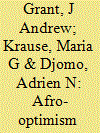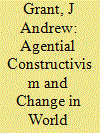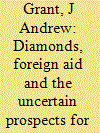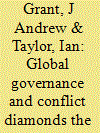|
|
|
Sort Order |
|
|
|
Items / Page
|
|
|
|
|
|
|
| Srl | Item |
| 1 |
ID:
146644


|
|
|
|
|
| Summary/Abstract |
The Africa Day 2015 Symposium provided a unique opportunity to develop glocal networks among activists, learners, scholars, researchers, and community members based in central Canada and other parts of the world. The Symposium examined a wide range of scholarship on Africa including calls for ending oppression based on sexual identity, greater policy responses to health, gender, and human security challenges, improving governance of natural resources, and investigating the prospects for glocal networks. While this scholarship stressed the need for Afro-optimism, it also drew attention to on-going human security challenges faced by many across the continent. This article builds upon the momentum from the Symposium by amplifying the voices of African scholars and enhancing mentorship, emphasizing greater cooperation among researchers and communities based inside and outside Africa, and defeating misconceived allusions to Afro-pessimism. Based on critical scholarship, the article also highlights innovative governance insights that are adapted to specific situations across Africa.
|
|
|
|
|
|
|
|
|
|
|
|
|
|
|
|
| 2 |
ID:
160057


|
|
|
|
|
| Summary/Abstract |
Like Alice, speaking out loud as she seeks to figure out the jarring changes in her physical stature and make sense of her new environment in Lewis Carroll's classic literary work Alice's Adventures in Wonderland, so too are international relations (IR) scholars and observers trying to comprehend recent and ongoing changes in the global political order. I concur with Paul (2017, 2) that we are living in “a time of major changes in world politics. These are driven by, among other things, the rise of new powers, deepened economic globalization, and the emergence of violent transnational forces.”
|
|
|
|
|
|
|
|
|
|
|
|
|
|
|
|
| 3 |
ID:
073202


|
|
|
| 4 |
ID:
052914


|
|
|
| 5 |
ID:
172876


|
|
|
|
|
| Summary/Abstract |
In this article, we analyse the factors underpinning the shift towards hybrid security governance in Africa. Extant scholarship largely attributes this shift to broader global processes, such as histories of colonialism, neoliberalism and transformations in global governance, which have served to legitimize the role of private authority in security provision around sites of resource extraction. Our analysis seeks to understand the relative and relational influence of power and rules in international politics by offering empirical insights about what hybrid security arrangements look like ‘on the ground’. Drawing upon recently conducted fieldwork in Kenya, Uganda and Ghana, we examine how hybrid security arrangements affect the lives of those living near sites of natural resource extraction. Our analyses suggest that although hybrid security has emerged as the leading approach to security governance, this approach to security does not uniformly involve or serve the interests of all stakeholders. Rather, we find that hybrid security arrangements aid the security of extractive operations—securing investments in both physical and human capital—while sometimes undermining the security of nearby communities.
|
|
|
|
|
|
|
|
|
|
|
|
|
|
|
|
|
|
|
|
|